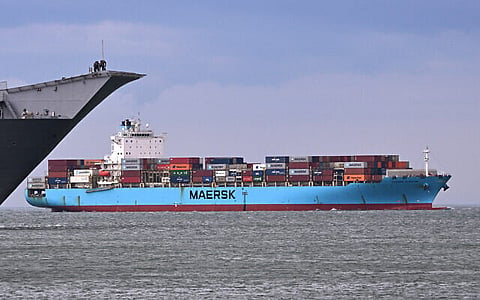
- NEWS
- the EDIT
- COMMENTARY
- BUSINESS
- LIFE
- SHOW
- ACTION
- GLOBAL GOALS
- SNAPS
- DYARYO TIRADA
- MORE

International Container Terminal Services Inc. (ICTSI) has stood firmly that its bid to privatize Durban Port was stronger than that of its competitor, Maersk’s APM Terminal, amid ongoing disputes over the South African government’s privatization process.
In a strongly-worded statement issued Monday, ICTSI chairman Enrique K. Razon Jr. defended the transparency and fairness of the tender process, highlighting that ICTSI’s bid was $100 million higher than Maersk’s.
The gaming and ports tycoon also criticized Maersk’s legal challenges, suggesting they aim to obstruct the government’s economic agenda and delay the port’s privatization.
“(It) was a well-run, rigorous, and transparent tender process. We outbid Maersk by $100 million, and now they are attempting to use a non-essential technicality to prevent the Government of South Africa from advancing its economic agenda,” Razon said.
Clearly-defined standards
Razon pointed out that the qualification standards for the tender were clearly defined, allowing Transnet, South Africa’s port and rail operator, to evaluate bids according to the law and public interest.
Likewise, he expressed concern that Maersk’s objections are based on an undefined criterion that could disqualify major global corporations, including Apple, as well as around 40 percent of the companies listed on the Johannesburg Stock Exchange.
Additionally, Razon questioned the timing of Maersk’s legal challenge, noting that it was filed nine months after ICTSI’s bid was accepted.
Durban Container Terminal (DCT2) is a key hub for South Africa’s import traffic, handling 46 percent of the country’s container volume. It is Transnet’s largest terminal and processes 72 percent of Durban’s total container traffic.
As part of its broader strategy to improve port operations, Transnet has announced plans for further privatizations.
In April, Transnet launched a search for an operator to manage Cape Town’s liquid bulk terminal and is preparing a tender for the RoRo terminal in Port Elizabeth.
Employing technicality
“We outbid Maersk by $100 million and they are attempting to use a non-essential technicality to ensure that the Government of South Africa does not succeed with part of its economic agenda. The qualification rules were very clear: Transnet could and can evaluate the bidders in whatever way was in line with the law and met the public interest,” according to Razon.
He argued that Maersk is now questioning an undefined metric that even some of the world’s largest public corporations, like Apple, could not meet..
“It is also (impossible) for as many as 40 percent of the top 40 companies on the Johannesburg Stock Exchange, including South Africa’s largest banks and insurers.
Moreover, Maersk has attempted to suggest their case required urgent intervention. However, this is the same company that waited 9 months before launching a case after ICTSI’s bid was accepted as the best,” he said.
Further, Razon stressed that Maersk has dominated the South African market since it acquired SAFMarine over 20 years ago, and today Maersk holds a dominant position and strong pricing leverage in the market.
“Maersk is (clearly) desperate to prevent the entry of an independent common user terminal operator. In short, after failing to produce a strong bid, they are instead trying to delay and stop the process by using the Courts,” the Filipino shipping mogul disclosed.
